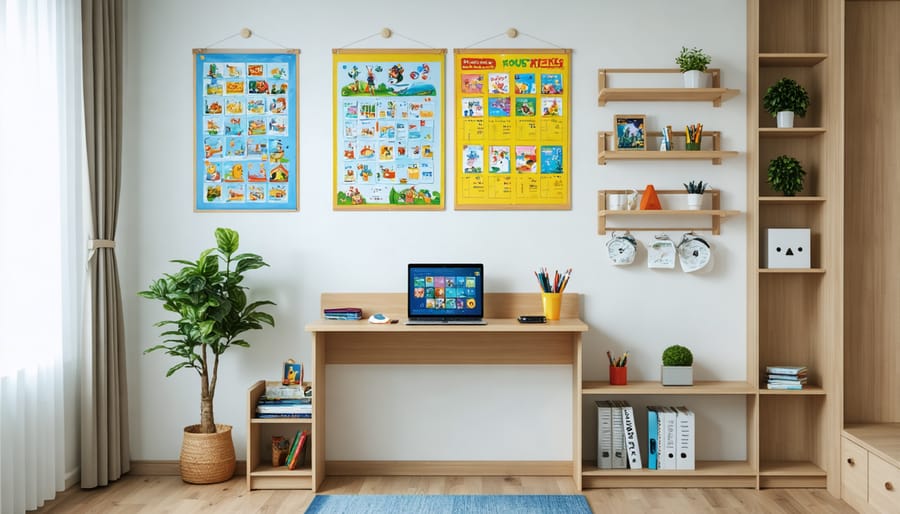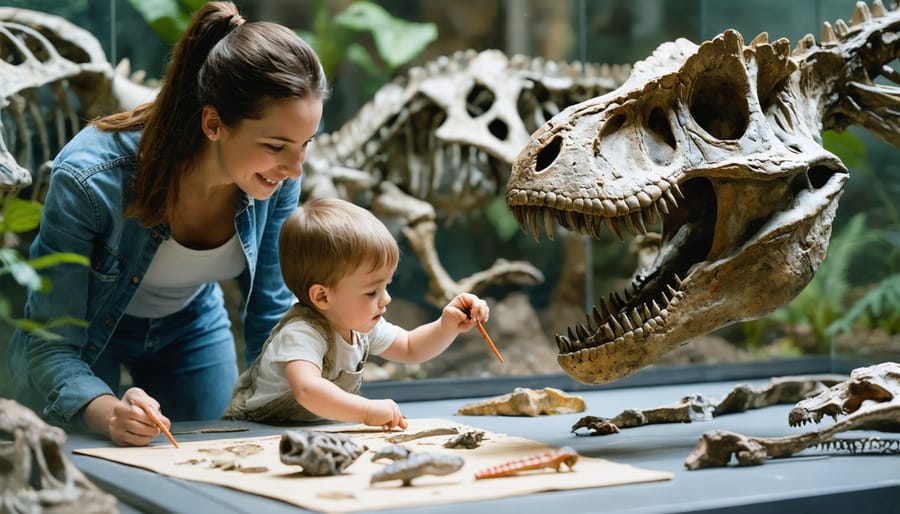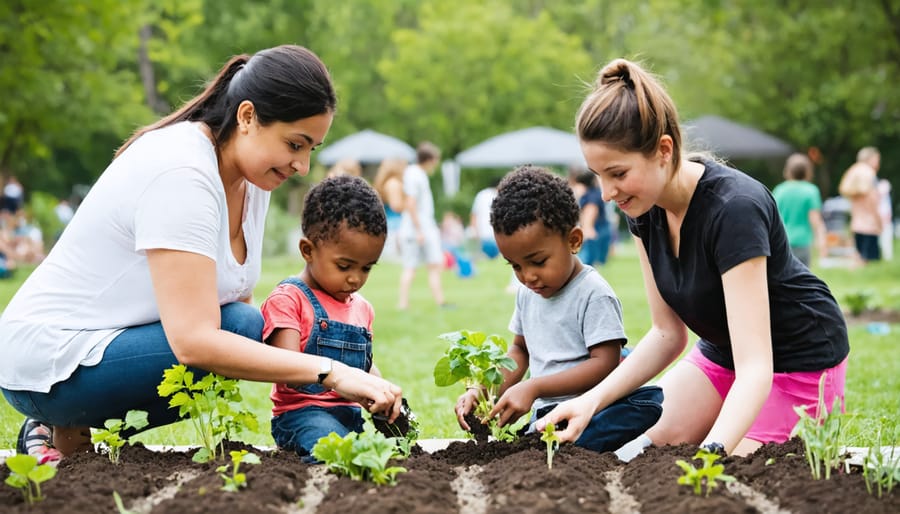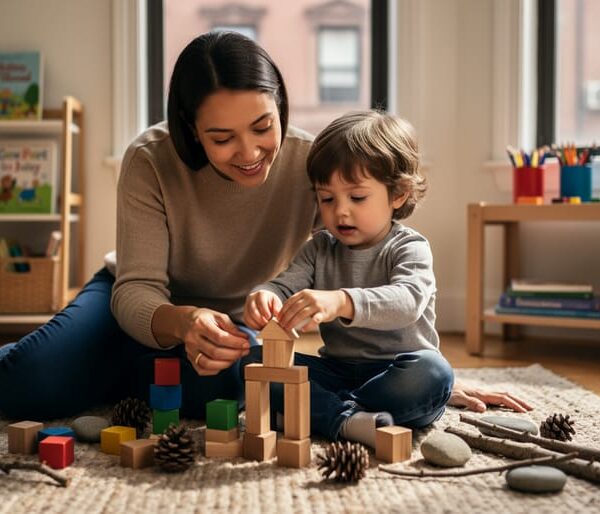Transform your living room into a dynamic learning space by organizing subject-specific zones, complete with dedicated areas for reading, hands-on experiments, and digital learning. Educational flexibility remains the cornerstone of successful homeschooling, allowing parents to adapt teaching methods to each child’s unique learning style and pace while meeting New York State’s academic requirements.
City-based homeschooling opens doors to extraordinary educational opportunities that traditional classrooms can’t match. Leverage museums, libraries, and cultural institutions as extensions of your home classroom. Schedule weekly field trips to the American Museum of Natural History for science lessons, practice foreign language skills in ethnic neighborhoods, or study architecture through Manhattan’s iconic skyline.
The most effective homeschooling approaches combine structured learning with spontaneous teaching moments. Create a flexible daily schedule that balances core subjects in the morning with project-based learning in the afternoon. Integrate real-world math through grocery shopping, develop writing skills through family blogs, and explore science through urban gardening projects. This practical approach ensures children master essential academic skills while developing critical thinking abilities that prepare them for future success.
Traditional Curriculum Adaptation for Urban Settings
Space-Efficient Learning Stations
Living in New York often means working with limited space, but creating an effective learning environment is still achievable with smart planning. Start by identifying multi-purpose furniture solutions, like fold-down desks that can be tucked away after lessons or ottoman storage cubes that double as seating during reading time.
Vertical space is your ally in small apartments. Install floating shelves to store educational materials and create a compact learning corner using wall-mounted organizers. Rolling carts can house supplies and be easily moved between rooms, perfect for families sharing living spaces.
Consider creating “learning stations” that can be set up and dismantled quickly. A lap desk for morning lessons, a corner of the kitchen counter for science experiments, or a cozy window nook for quiet reading all work well. Use clear storage bins labeled by subject to keep materials organized and accessible.
Remember that not every lesson needs a dedicated space. Your dining table can transform into an art studio, while floor cushions can create a comfortable spot for group discussions. The key is flexibility and organization, allowing your home to serve multiple purposes throughout the day.

Urban-Friendly Schedule Planning
Living in New York City offers unique opportunities to create a homeschool schedule that embraces urban dynamics. Start by identifying your family’s natural rhythm within the city’s pulse. Perhaps your children are more alert mid-morning after the rush hour settles, making this an ideal time for focused learning.
Take advantage of off-peak hours at museums, libraries, and parks. Schedule core subjects during quieter morning hours, then use afternoons for experiential learning at cultural institutions when they’re less crowded. Many NYC museums offer weekday discounts or free admission times, perfect for regular educational visits.
Consider weather patterns when planning outdoor activities. Use rainy days for indoor subjects and save nature studies for pleasant weather in places like Central Park or the Brooklyn Botanic Garden. Public transportation can become part of your learning routine – practice math while calculating subway times or study local history during bus rides.
Build flexibility into your schedule to accommodate city events and opportunities. Keep mornings consistent for stability, but allow afternoon adaptability for special exhibitions, workshops, or community events. This urban-aware approach turns city living from a potential challenge into an educational advantage.
City-Based Learning Opportunities
Museum and Cultural Institution Programs
New York City’s wealth of museums, cultural institutions, and historical sites offers homeschooling families an incredible opportunity to enhance their curriculum through experiential learning. These venues often provide specialized homeschool programs, workshops, and educational series designed specifically for home educators and their students.
Many major museums, including the American Museum of Natural History and the Metropolitan Museum of Art, offer structured homeschool days with guided tours, hands-on activities, and curriculum materials that align with various subjects and grade levels. When planning educational field trips, consider scheduling visits during off-peak hours for a more focused learning experience.
Take advantage of institutional memberships, which often provide free admission, exclusive programming, and early access to special exhibitions. Some cultural centers offer semester-long programs where students can dive deep into specific topics, from art history to scientific research. These programs frequently include pre and post-visit materials to help integrate the experience into your broader curriculum.
Don’t overlook smaller institutions like neighborhood historical societies, community art galleries, and cultural centers. These venues often provide more personalized experiences and are typically eager to accommodate homeschool groups with customized programming that matches your educational goals.
Remember to document these experiences through photographs, journals, or project work to create lasting connections between cultural visits and your core curriculum objectives.

Urban Nature Studies
Living in New York City doesn’t mean your child’s science education has to be confined to textbooks. Our urban environment offers countless opportunities for hands-on nature studies. Central Park alone hosts over 170 tree species, making it a perfect outdoor laboratory for botany lessons. Start by creating a nature journal where your child can sketch and document seasonal changes in local plants and trees.
City parks provide excellent venues for studying urban wildlife. Watch squirrels cache food in autumn, observe bird migration patterns, or study how pigeons adapt to city life. Many community gardens welcome homeschooling families and offer opportunities to learn about plant life cycles, composting, and urban agriculture firsthand.
The city’s green spaces also present perfect opportunities for environmental science lessons. Students can measure air quality differences between busy streets and park interiors, study urban water cycles through rain gardens, or investigate how plants grow in different urban microclimates.
Don’t overlook smaller spaces like window boxes or rooftop gardens. These can become mini-laboratories for experiments in plant growth, pollination, and soil composition. Even studying moss growing between sidewalk cracks can lead to fascinating lessons about adaptation and survival in urban environments.
Remember to visit the city’s botanical gardens, which often offer educational programs specifically designed for homeschoolers. These visits can complement your nature studies with expert guidance and structured learning experiences.
Digital Learning Integration
Online Resources for NY Standards
New York homeschoolers have access to a wealth of digital resources that align perfectly with state requirements. The EngageNY website offers free, comprehensive curriculum materials across all core subjects, specifically designed to meet NY learning standards. For math support, IXL Math provides adaptive practice aligned with NY standards, while ReadWorks delivers grade-level reading materials with built-in comprehension assessments.
Khan Academy’s structured lessons complement NY’s learning requirements, particularly in mathematics and sciences. Time4Learning offers a complete online curriculum that can be customized to follow NY’s grade-level expectations. For science, Mystery Science provides engaging video-based lessons that satisfy state standards while keeping students excited about learning.
New York’s BOCES (Boards of Cooperative Educational Services) virtual learning platform offers additional resources specifically for homeschoolers. The NY Homeschool Compliance website maintains an updated database of educational tools that meet state requirements, making it easier for parents to track and document their children’s progress throughout the academic year.
Remember to supplement these digital resources with hands-on activities and real-world experiences to create a well-rounded learning environment.
Virtual Field Trips and Classes
Today’s digital technology opens up incredible learning opportunities for homeschoolers right from your living room. Through virtual field trips, your children can explore world-famous museums like the Metropolitan Museum of Art, venture through national parks, or take guided tours of historical landmarks across the globe. Many of these experiences are free or low-cost, making them perfect for New York families looking to enrich their curriculum.
Popular platforms like Google Arts & Culture offer high-resolution artwork views and virtual museum walks, while NASA’s website provides interactive space exploration experiences. For science enthusiasts, organizations like the American Museum of Natural History offer virtual labs and online classes that align perfectly with STEM learning objectives.
Live online classes have also become a valuable resource for homeschoolers. Your children can join virtual art workshops, language classes, or coding sessions with other students worldwide. These interactive experiences not only provide structured learning but also offer opportunities for social interaction and collaborative projects. Many New York cultural institutions now offer dedicated virtual programming specifically designed for homeschool students, combining local relevance with digital convenience.
Community-Based Education Methods
Homeschool Co-ops in the City
Urban homeschooling doesn’t mean you have to go it alone. City-based homeschool co-ops offer fantastic opportunities for families to connect, share resources, and create enriching learning experiences. As homeschooling tips from experienced educators suggest, these collaborative groups can provide structure, socialization, and specialized instruction that complement your home curriculum.
In New York City, co-ops often meet in community centers, libraries, or rented spaces, where parents take turns teaching subjects based on their expertise. Your child might learn chemistry from a former lab technician one day and art history from a museum curator the next. These arrangements also help distribute the teaching workload while exposing children to different teaching styles and perspectives.
Many urban co-ops organize field trips to museums, theaters, and cultural institutions, taking full advantage of city resources. They also coordinate group activities like science fairs, spelling bees, and sports events, creating a sense of community while maintaining educational flexibility. Some co-ops even pool resources to hire specialized instructors for subjects like foreign languages or music, making quality instruction more affordable for everyone involved.

City Service Learning Projects
City-based homeschooling offers unique opportunities for hands-on learning through community service projects. New York’s diverse neighborhoods and organizations provide countless ways for students to engage in meaningful educational experiences while giving back to their community.
Local food banks and soup kitchens offer excellent learning environments where students can practice math skills through inventory management and meal planning. They’ll also develop social awareness and empathy while serving others. Libraries often welcome young volunteers for reading programs, allowing homeschoolers to improve their communication skills while helping younger children develop literacy.
Environmental initiatives, such as community gardens and park clean-ups, create natural science laboratories where students learn about ecology, botany, and environmental stewardship. These projects seamlessly blend biology lessons with civic responsibility.
Many museums and cultural institutions offer youth docent programs, enabling students to learn art, history, and public speaking while sharing knowledge with visitors. Senior centers welcome young volunteers, creating opportunities for oral history projects and developing intergenerational relationships.
Through these service-learning experiences, homeschoolers gain practical skills, build character, and create meaningful connections within their community. These real-world applications often prove more valuable than traditional textbook learning, especially in preparing students for future academic and professional endeavors.
Successfully homeschooling in an urban environment like New York City requires creativity, flexibility, and resourcefulness – qualities you’ve already demonstrated by choosing this educational path. As we’ve explored throughout this guide, the city offers unique advantages for home educators, from world-class museums to diverse cultural experiences that can enhance your child’s learning journey.
Remember that there’s no one-size-fits-all approach to homeschooling. Whether you choose traditional textbook learning, unschooling, or a hybrid method, the key is finding what works best for your family’s schedule, learning styles, and educational goals. Take advantage of your city’s resources: join local homeschool groups, participate in community activities, and utilize public spaces like libraries and parks as extended classrooms.
Don’t be afraid to adapt and modify your approach as needed. Start small, establish consistent routines, and gradually expand your educational activities. Stay connected with other homeschooling families for support and inspiration, and remember that challenges are normal parts of the learning process – for both parents and children.
Most importantly, trust in your ability to provide a quality education for your children. With proper planning, dedication, and the wealth of resources available in our city, you can create an enriching homeschool experience that prepares your children for future success while strengthening family bonds.




